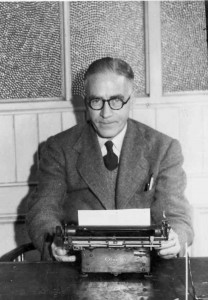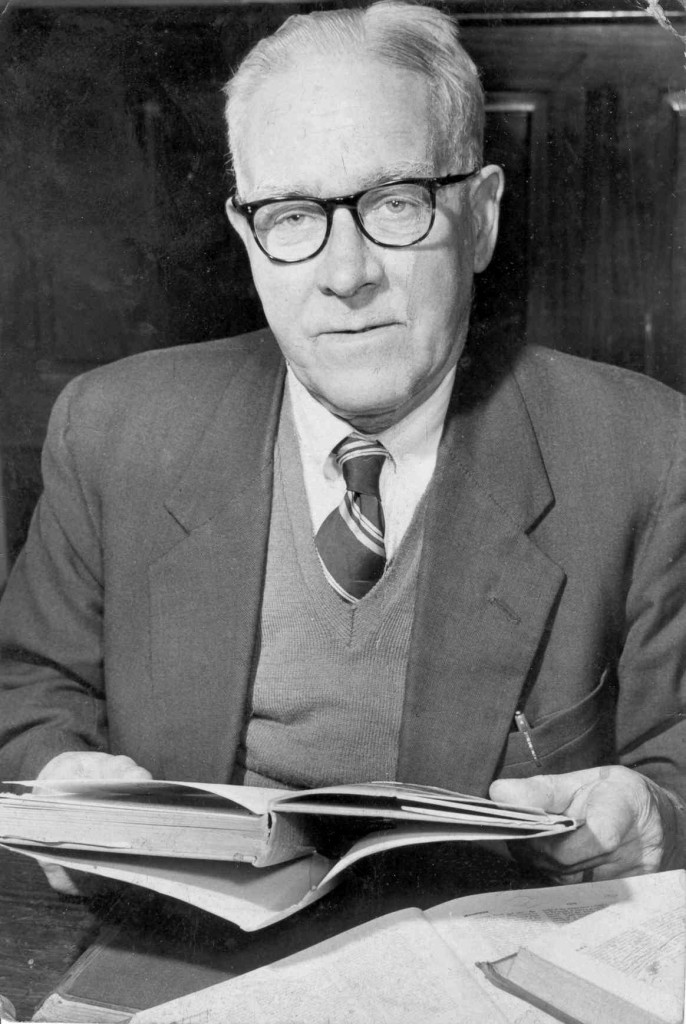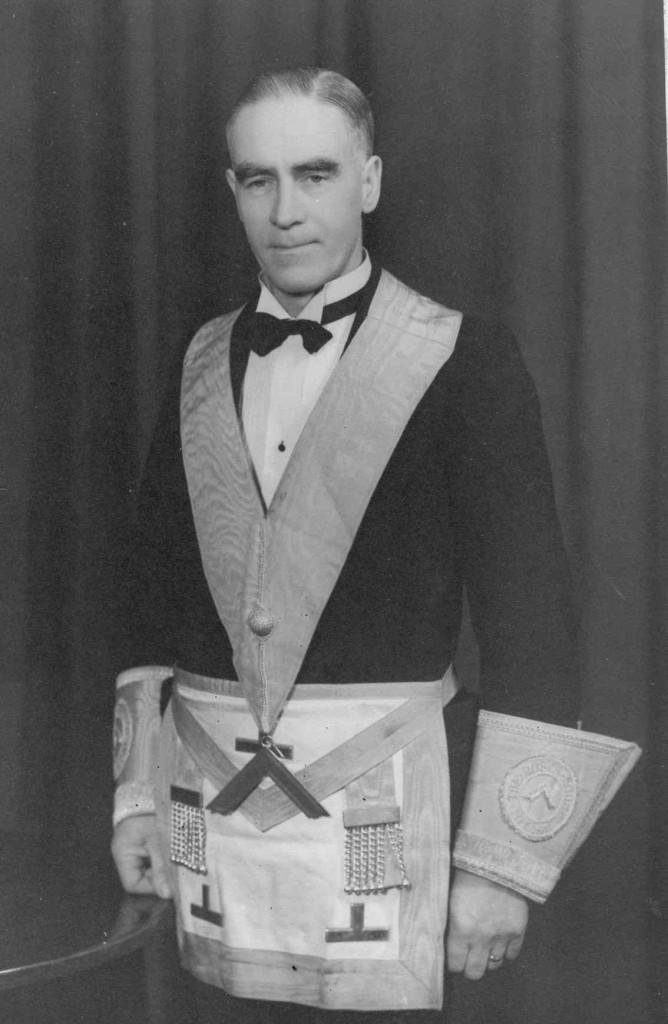Joe Sunter (1895-1968): Editor Colne Times, war hero, civic leader and family man
This is the story of Lofty’s Uncle Joe Sunter as told in the Colne Times of 1962. The photographs have been kindly provided by Joe’s Grandson Peter Hambrey.
In its time our “People and Faces” spotlight has fallen in many places.
We have featured sportsmen and musicians, tradesmen and actors even councillors, licensees, policemen. We have looked from many angles, as many walks of life.
On this occasion, without apology, we turn the spotlight on one of our colleagues – journalism’s elder statesman in Nelson and Colne.
To us in this remarkable profession compounded of facts and more facts, imagination, printers ink, type metal, hot tea and more sweat on the brow than most people give us credit for he is “Joe” – Mr Joseph Sunter.
Joe Sunter, though, is more than a journalist. He is a man of determination, and a man of no mean literary ability. Under the surface, he is something of wit and raconteur. Without a doubt, he is a character .
To his younger colleagues, he is a friend and counsellor.
To all, he can be a mine of information about almost any facet of journalism – and Colne -one cares to mention. In this respect it is enough to say that when he has been troubled by ill-health as has too often been the case in recent years, the office has been strangely lacking in something without the rattle of the typewriter from his desk.
The story of Joe Sunter the journalist must, of course, predominate in any review of his life , for he has been one of us 50 years . It was in 1911, when he was 16, that he started as a junior reporter on the “Darwen News”.
 There is little in common between the polysyllable journalism of those days and that of 1962. Hours were long, wages were low, and the best that could be said of the good reporter in those days was that he was a capable stenographer, able to start at the beginning of the story and make a full note until the end of it.
There is little in common between the polysyllable journalism of those days and that of 1962. Hours were long, wages were low, and the best that could be said of the good reporter in those days was that he was a capable stenographer, able to start at the beginning of the story and make a full note until the end of it.
For good or ill, the whole concept of reporting has changed in Joe’s lifetime-but what applies as much today as it did then is the fact that journalism is more than a job. To those who love it, it is a way of life.
Three years on the “Darwen News” were sufficient to develop that the love of the life in Mr Sunter But when the course of history started to change in 1940 he had no hesitation in volunteering for service ; he joined the Army in September of that year, and served until 1919.
Discharged from the Army, he joined the “Nelson leader,” then under the editorship of the late Mr Tom Morgan. Two years later he moved to the “Lancashire Daily Post,” as district reporter, with an office in Railway Street, Nelson.
From there he went to the Burnley office of the “Northern Daily Telegraph,” transferred some time later to the Accrington office, and then in 1929 at the age of 34, moved to Colne to take the editorship of the “Colne Times.”
Whilst at Burnley, week in week out in the season, he covered Burnley football during the golden years of Dawson, Bob Kelly, Cross and Weaver. At Accrington his job brought him in close touch with Accrington Stanley, at a time when ex-Nelson player Joe Eddleston was with the team.
Earlier still, working at Nelson, he was one of the Pressman covers Blacko Bar disaster, which remains to this day one of the worst accidents local roads have ever seen.
Joe Sunter, as an editor was one who worked with his staff. He could command intellectual respect, yet he was always available to give help and advice. And he was as much accessible to his readers as he was to the staff.
He was, of course, principally a literary type of editor. He specialised in a well turned leading article or some concise note on the towns affairs, and he took it upon himself to become closely associated with the life of Colne.
He was a founder member of the Colne Rotary club, in fact. He was a committee member of the old Literary Society, giving papers before the society as well as regularly attending meetings. He made it his job as an editor to keep in close touch with the town’s civic affairs.
For more than 30 years, Mr Sunter was editor at Colne. Last year, at the age of 66, he retired from the position, but without the necessity of laying down his pen. In a part-time capacity he still writes regularly if not so voluminously as before.
There are, of course, other aspects of Joe Sunter. Side issues, as it were, at all bound up in some way with his journalistic career.
He is a man who is very well read, with a tremendously wide knowledge of literature, able to quote accurately, aptly and with discrimination from an astonishing range of authors.
What may surprise even his closest friends is that, in this respect, his is almost wholly self-taught. From the age of 12 he was brought up in an orphanage near Bolton, for the Thornaby-on-Tees family of ten to which he belonged broke up on his father’s death.
Orphanage life, if tolerable, was spartan, and admitted of none but the barest necessities – of which literature was hardly one. A book of poems which he received whilst there possible sowed the seeds of a love of books and reading, but that love was nurtured solely by himself and his devoted reading in years to come.
Possible too, three early assignments in his “Darwen News” days helped. G. K. Chesterton, Hilaire Belloc, and George Bernard Shaw were three of the distinguished speakers whose lectures he reported as a junior, and one would expect men of this calibre to have some effect on a young man with a thirst for knowledge.
His shorthand he learned from an assistant in the governor’s office at the orphanage and it was this man who first introduced him to Esperanto. This apart, however, it has been left to Joe Sunter’s determination and courage to carry him to a post of responsibility.

With the Royal Irish Regiment he took his part in the Gallipoli landings. Then he was sent to France and was wounded at Ypres. He was still in hospital blue in 1918 when he married.
Even then, a life which had given him more than his share of ups and downs, was reserving the cruellest blow. Soon after becoming editor of the “Colne Times” at a time when he had achieved considerable success at an early age, he found his wife was suffering from an incurable disease.
For 26 years, whilst carrying on with his job, and through the second world war when the newspaper’s staff was reduced to two and A.R.P. duties had to be carried out as well, he nursed her.
Courage of a different sort from that needed to wade ashore at Sulva Bay and face the enemy guns in Flanders, but courage all the same.
He displayed that wiry toughness of his later, when he broke his leg and crawled for help – and then insisted on going to the office on crutches. He has displayed it since then when….notwithstanding, he has insisted on remaining associated with his newspaper.
With his memories and a life-time’s accumulation of books for company, Joe now lives alone in a small cottage in Keighley Road, Colne. Not far away lives his son Barry, a teacher, and from time to time he visits his daughter Dorothy, at her home in Cheshire.
Any regrets after a lifetime in journalism?
Can there possible be? Journalism is a way of life, and the most bewitched and attractive calling in the world. Joe Sunter knows that as well as us.
Roger Siddall.
‹ Two views of Winterton hospital Dyer and Gardner families ›